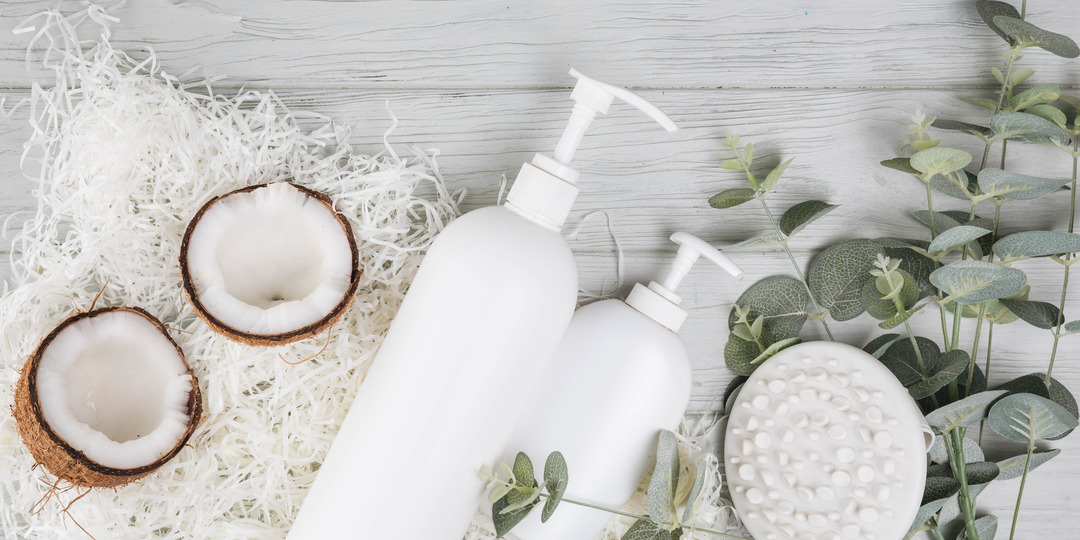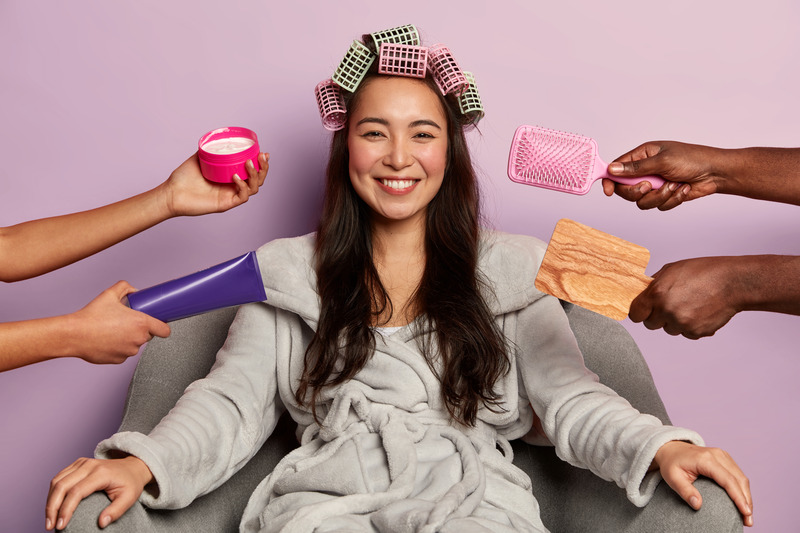
Shampooing is part of our hair care routine and significantly impacts our hair. While we shampoo for a few minutes and don’t leave the shampoo in our tresses for long, shampoos have a significant role in our hair and scalp health.
It’s essential to use mild, gentle, and chemical-free products for healthy hair and scalp. The good news is that making a chemical-free homemade shampoo is possible and easy.
Today, we will learn more about coconut oil and how to prepare coconut oil shampoo.
The Benefits of Coconut Oil for Hair

We all know coconut oil is good and use it in our hair routine, but what exactly does it do? Why is it unique? Ever wondered about it? Learn more about coconut oil and how it helps hair and scalp health.
Coconut oil is one of the most widely used natural oils for hair care in some countries and is said to promote hair growth. Its antifungal and antimicrobial properties keep dandruff and other similar issues at bay.
Do you know it combats lice? Promotes healthy hair by combatting split ends, hair breakage, and hair damage.
Richly moisturizing coconut oil moisturizes and hydrates dry scalp and hair. Is your hair damaged? Coconut oil helps restore lost luster and shine.
It repairs and rejuvenates dry, dull, and damaged hair. It is rich in lauric acid, a medium-chain fatty acid that offers many benefits. The derivative of lauric acid is sodium lauryl sulfate, a natural cleanser.
Coconut oil can penetrate the hair shaft and is deeply moisturizing. It can tame frizz and make hair stronger.
Why Choose Homemade Shampoo and Conditioner?
You are in for a surprise if you’re using a store-bought shampoo. Just check the ingredients list, and you’ll find a lot of known and unknown chemicals, parabens, damaging and harmful ingredients, and more.
Today, chemical-laden shampoos are the new normal. If you want a healthier, safer, and eco-friendly option, it’s essential to choose homemade conditioner and shampoo.
Any regular shampoo you choose off shelves includes chemicals, and some also include xenoestrogen, which interferes with hormonal levels in the body.
Though chemical-laden shampoos are known to be damaging and harmful, many buy them thinking there are no alternatives. We buy into the brand name facade when they’re often the primary culprits.
Did you know a store-bought shampoo often comes with known carcinogens, which means they’re cancer-causing? On the other hand, homemade shampoos are chemical-free and made using mild and natural ingredients that are available in most homes.
Homemade shampoos are pocket-friendly as they cost a fraction of commercial shampoos. You can customize your natural shampoo according to your preferences and requirements.
These are just a few reasons to choose homemade shampoo and conditioner.
Key Ingredients for DIY Shampoo and Conditioner
Each recipe is different, but some ingredients appear in many recipes. Let’s look at a few widely used ingredients in DIY shampoo and conditioner recipes.
Castile Soap – This is our mild base for all our lye-free recipes so that we can skip processing lye for our shampoos.
Coconut Oil – We have already discussed the many benefits of coconut oil and are using it as one of our main ingredients for homemade shampoo and conditioner.
Coconut Milk – Richly moisturizing, it makes hair softer and moisturized. It also restores hair and scalp health, protects and prevents hair damage, and promotes hair growth. Rich in protein and vitamins C, E, B-6, B-5 & B-3, it nourishes and strengthens hair. It also helps prevent split ends.
Olive Oil – If you have dry and thick hair, you’ll greatly benefit from this moisturizing oil. It keeps hair strong and combats frizz. It also prevents split ends but tends to weigh down fine hair.
Jojoba Oil – Close to our skin’s sebum, Jojoba oil is a wax suitable for all skin and hair types. Our body and light readily absorb it.
With a rich nutrient profile, it nourishes and strengthens hair. It is also a great moisturizer, adds shine, and reduces frizz.
Essential Oils – Essential oils are concentrated plant extracts that offer numerous benefits when used regularly. There are many hair-beneficial essential oils, including lavender essential oil, rosemary essential oil, frankincense essential oil, etc.
They also add aroma to your homemade products naturally.
Aloe Vera – Aloe vera gel intensely moisturizes, hydrating yet light and hypoallergenic. It suits most and can keep your locks strong, healthy, moisturized, and shiny.
Step-by-Step DIY Shampoo and Conditioner Recipes
Now that we’ve covered the basics, let’s look at a few recipes you can try. All the recipes are lye-free and beginner-friendly, so even if you haven’t started DIY, you can start with these.
Vegan Coconut Oil Shampoo
This is a quick and easy shampoo you can try when strapped for time and patience.
Ingredients
Liquid Castile Soap – 1/2 Cup
Distilled Water – 1 Cup
Jojoba Oil – 1 Tbsp.
Coconut Oil – 2 Tbsps.
Coconut Extract – a few drops
Instructions
- Add all the ingredients one after the other in a sterilized shampoo dispenser – coconut oil, liquid castile soap, water, and Jojoba oil, followed by coconut extract.
- Shake gently to combine and use as needed.
Notes
- You can use this twice or thrice a week.
- You can finish off with an apple cider vinegar rinse for added shine.
- Coconut extract compliments coconut oil well. But you can add any essential oil of your choice to the recipe.
- You can also add aloe vera gel for added shine and hydration.
- You can use any carrier oil in the recipe, along with Jojoba Oil, like Olive Oil, Sweet Almond Oil, etc.
Vegan Coconut Milk Shampoo
This is a no-poo shampoo you use like a mask, but don’t worry; it works wonders for your hair.
Ingredients
Coconut Milk – 1/2 Cup
Coconut Oil – 1/4 Cup
Instructions
- Mix the coconut milk and coconut oil well.
- Apply the mixture to your hair and scalp.
- Wrap your head with a shower cap and let this mixture sit for about 20 minutes.
- Rinse off with hot water for silky, soft, and shiny hair.
Vegan Coconut Milk Shampoo
We’ve got you covered for those used to suds and prefer that when shampooing. Let’s get started.
Ingredients
Coconut Milk – 1/2 Cup
Liquid Castile Soap – 1/2 Cup
Coconut Oil – 1 Tsp.
Distilled water – as needed
Instructions
- Add the coconut milk and coconut oil to a sterilized shampoo bottle
- Add in the liquid castile soap and shake to combine.
- You can add distilled water to get the pliable shampoo consistency.
Notes
- You can add essential oils to the recipe.
- You can also add aloe vera gel to the recipe for added hydration.
Vegan Coconut Oil Hair Conditioner
This is a leave-in recipe and relatively easy to prepare.
Ingredients
Coconut Oil – 1/4 Cup
Jojoba Oil – 2 Tbsps.
Lavender Essential Oil – a few drops
Instructions
- Add coconut, jojoba, and lavender essential oil to a sterilized dark amber bottle.
- Shake gently to combine and let it sit for a few days before using.
How to Use the Coconut Oil Conditioner?
- Take a few drops of the coconut oil conditioner in your palm.
- Gently dab your fingertips and rub against your time to warm up the oil and massage your scalp with the coconut oil conditioner.
- You can apply the coconut oil conditioner to damp or air-dried hair.
- Style as usual.
Application and Usage Tips
Shake before every use to combine the ingredients well.
Use as you would your typical shampoo or conditioner.
Air dry for best results.
You can use a natural shampoo twice or thrice a week, followed by conditioning, but in most cases, twice a week is good.
Use lukewarm or cold water for washing your hair to prevent drying and frizz, as hot water tends to strip off your natural oils.
Hair Care Tips for Maintaining Beautiful Hair

- If you have oily hair and scalp, washing your hair thrice a week is beneficial. Otherwise, twice a week would be ideal.
- Finish off with nourishing rinses for stunning locks – rosemary tea, rice water, rose hydrosol, apple cider vinegar, etc. are great choices.
- You can use baking soda to clarify your scalp. Don’t use it more than once or twice a month to prevent hair drying.
- Avoid or minimize styling treatments and tools whenever you can. Styling can leave lasting damage to your hair.
- Always air dry your hair; when you can’t, use your dryer in fantastic settings to prevent damage.
- Use hair protection when using heat and styling tools.
- Don’t wash your hair more frequently than necessary.
- Have a balanced diet for healthy hair.
- Don’t forget to oil your hair regularly.
- Deep conditioning oil massages and nourishing hair masks help with overall hair and scalp health.
Safety Precautions
- We’re preparing our hair care products using natural ingredients that are mostly safe. But natural doesn’t mean no allergies or sensitivities. So, always do a patch test to check for sensitivities or allergies.
- Don’t use any ingredients you’re allergic or sensitive to.
- Always use fresh and natural ingredients for your recipes.
Bottom Line
So, now we know how to prepare our own shampoos and conditioners for hair care. Next time you reach for that commercial shampoo, think again.
These recipes are easy, natural, and pocket-friendly. Do give these a try and see how they work for you.
Don’t have time for DIY recipes? We have you covered with a range of premium vegan hair care cosmetics from Vitamins Revive. Check out their online store to learn about their products.
As always, feel free to tweak the recipes and make them more suitable for your requirements and preferences. That’s the fun part of DIYing, isn’t it? DIY isn’t fun without experimenting.
Please write back to us with any questions, doubts, feedback, or requests. We love hearing from our readers.









